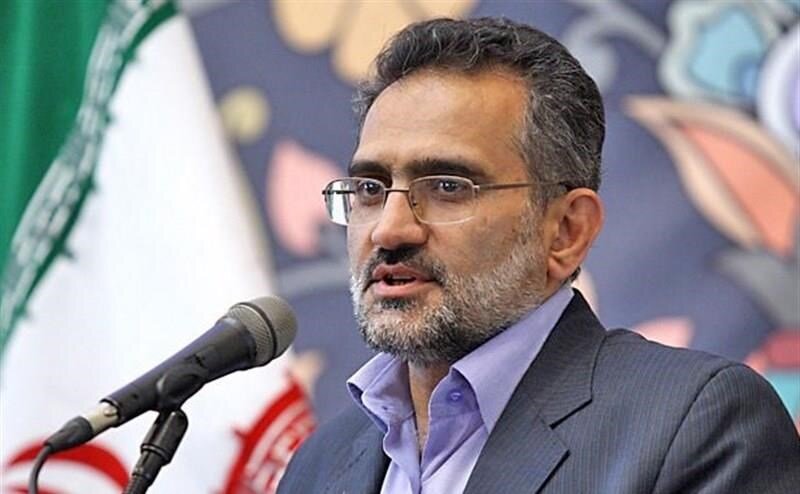British anger at Iran ballistic missiles understandable: Veep

TEHRAN – Seyed Mohammad Hosseini, Iran’s vice president for parliamentary affairs, has reacted to a British statement criticizing missiles firing by Iran during a massive military drill.
“British anger at the firing of ballistic missiles during the Great Prophet 17 drill. British Foreign Office: ‘We condemn Iran’s use of ballistic missiles,” Hosseini said on Twitter.
He added, “England’s anger, which once was omnipotent in the region, at the might of the Islamic Republic is understandable. But they should forcibly admit that the time when they were all-powerful [in the region] has elapsed.”
The Iranian official was referring to a statement by the UK Foreign, Commonwealth, and Development Office which denounced Iran's use of ballistic missiles.
“We condemn Iran’s use of ballistic missiles in a test launch confirmed to have been conducted today. The launch is a clear breach of UN Security Council Resolution 2231, which requires that Iran not undertake any activity related to ballistic missiles designed to be capable of delivering nuclear weapons – including launches using ballistic missile technology,” the statement said, adding, “These actions are a threat to regional and international security and we call on Iran to immediately cease its activities.”
The UK reaction came after the Islamic Revolution Guards Corps (IRGC) simultaneously fired 16 precision-guided missiles at a predetermined target.
The firings were conducted at the presence of senior IRGC commanders including Major General Hossein Salami and Armed Forces Chief of Staff Mohammad Baqeri.
Major General Baqeri said the maneuver had been planned before but military threats against Iran by the Zionist regime in the recent days made Iran hold the drill earlier and this was among “the most successful missiles exercises of the Islamic Republic so far.”
Baqeri said as the images of the firings of missiles will be shown to the world “all missiles hit a specified target with complete precision and they completely destroyed the designated target from very long distance.”
“This is a small part of Iran’s missile power,” the top military official added. “It means all these 16 missiles that simultaneously hit the target are a small part of hundreds of missiles that can simultaneously hit any” object that is targeted at Iran.
The Iranian Foreign Ministry has rejected the UK statement. Iranian Foreign Ministry Spokesman Saeed Khatibzadeh has rejected the meddling stance of the British Foreign Office on Iran’s defense capability, saying the Islamic Republic acts within the framework of international law and in accordance with its own defense needs. Khatibzadeh added that such remarks and stances are not only interference in Iran's internal affairs, but also indicate the continuation of adopting double standard policies by London.
He added that the UK is in a never-ending race to sell the most destructive weapons to West Asia and other crisis-stricken regions of the world and signs military pacts such as AUKUS in violation of non-proliferation rules and at the same time it is also concerned about Iran's routine military exercises.
The Iranian Foreign Ministry spokesman stressed that "the nuclear program of the Islamic Republic of Iran is peaceful, as verified by thousands of hours of inspections and numerous reports by the International Atomic Energy Agency. He added that Iran has not had and does not have plans on using nuclear energy for military purposes for which it wants to design its missile program. The British know better than anyone else that Iran's missile program has nothing to do with UN Security Council Resolution 2231 and its provisions. He added that it was Britain that, in interpreting UNSCR 2231, was in effect violating its provisions.
Khatibzadeh also said the British know better than anyone else that Iran's missile program has nothing to do with UN Security Council Resolution 2231 and its provisions.
The missile launch was part of the massive drill code-named the Great Prophet 17, which included a showcase of Iran’s newest homegrown arms and equipment. Various forces of Iran’s Islamic Revolution Guards Corps (IRGC) began the military drill along the southern coastlines of the country on Monday that lasted until Friday.
In a press briefing last week, Brigadier General Abbas Nilforoushan, the IRGC’s deputy chief of operations and spokesman for the drills, announced that various IRGC units such as the aerospace force and the cyber-electronic division would participate in the exercise.
The drill featured real-time firing of smart bombs, ballistic and cruise missiles targeting fixed and mobile targets. In addition, combat drones dropped bombs with pinpoint accuracy and Su-22 warplanes bombarded mock enemy targets in close air support (CAS) operation.
During the drill, the IRGC’s Ground Force put a new upgraded combat tank dubbed Karrar into service. the Karrar tank was operationalized during the exercise. Karrar is an upgraded version of the T-72m tanks that come into service for the first time.
The version of Karrar used by the IRGC Ground Force is equipped with a camouflage system that provides concealment against thermal infrared radar detection, according to Tasnim.
It is also furnished with an electro-optical fire control system, laser rangefinders, and a ballistic computer.
Leave a Comment